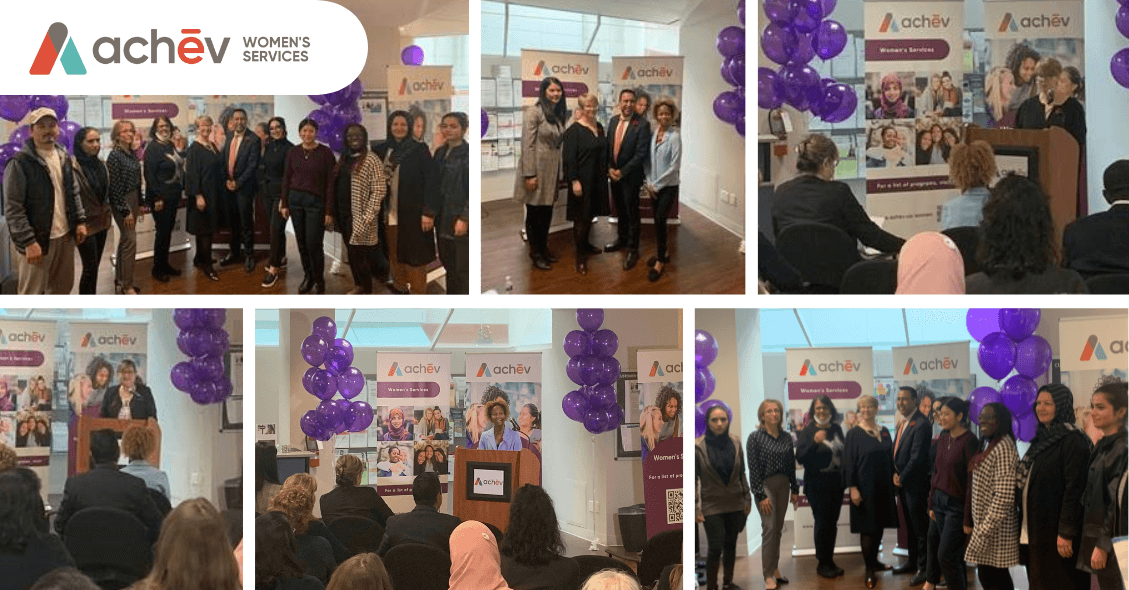BY PAUL JUNOR
It has been over eight years since Achēv, a not-for-profit, community-based organization has been offering employment programs and services free of charge in the Greater Toronto Area.
It has six locations: Brampton, Mississauga, Oakville, Pickering, Richmond Hill, and Toronto. According to its website:https://achev.ca/services/women, its programming is geared towards women and girls. Achēv’s range of programs and services are suited to the unique needs of women and girls to ensure they navigate employment, educational community and language needs.
Some of the programs that Achēv offers include the following:
Career pathways for newcomers
This program is funded by IRCC ad SRDC and is designed to provide highly skilled racialized newcomer women with the essential skills needed to successfully navigate the Canadian labour market.
Milestone to employment for newcomer women
This program focuses on continued long-term employment in the senior’s care sector.
EmpowerHer
This program was created to empower young women to become more engaged in their community through volunteerism.
Elevate
This program helps newcomer women, ages 19-45, strengthen their digital literacy skills while helping them develop their: social skills, labour market knowledge, community engagement, and volunteerism.
Women’s connections and empowerment program
This program complements Achēv’s existing settlement support programming in Halton to help immigrant and newcomer women to actively participate in their communities.
Advancing equity for women and girls
This program is funded by Women and Gender Equality (WAGE) and aims to promote the economic security and prosperity of immigrant and racialized women in the GTA.
Workplace pathways for women in senior care
This is a free employment program funded by the Ontario Government’s Skill Development Fund (SDF), which offers four weeks of online skills training and twelve weeks of paid work placement leading to employment and on the job support.
Preparing women and workplace for success (PWWS)
The PWWS project provides immigrant and racialized women with paid training and individualized employment support.
Achēv revealed that it has launched a new initiative that will be geared toward helping women, specifically newcomers and racialized women overcome hurdles to obtain secure employment, adapt and thrive.
Tonie Chaltas, CEO of Achēv stated, “We support women across the continuum of their lives, from first jobs and settlement to skills development and charting career paths. Achēv’s dedicated Women’s Pillar will allow us to provide more targeted support to the more than 50 000 women and girls who access our: employment, language, and newcomer services each year.”
I interviewed Tonie Chaltas on Tuesday, November 22nd, 2022, and she told me that Achēv started initially as part of the Peel District School Board (PDSB), but has expanded significantly. Achēv provides a wide range of services that go beyond newcomer’s language services, thanks to support from the federal and provincial governments.
She told me that Achēv has nine offices online that provide diverse services. She is excited about partnering with other organizations to fulfil its mandate.
The Women’s Pillar Initiative will make a big difference in many women’s lives in the next few months as they gain meaningful employment and improve their skill set.
In later press opportunities Chaltas stated, “We are building a village to support the more than 50,000 women we serve each year.” In 2021, Achēv had the distinction of serving over 101,000 clients. Women comprised 52,000 of the total and 3,600 are employers. Chaltas believes that only by diversifying the workplace will the competitiveness of today’s marketplace be increased.
Anyone interested in learning about the services that Achēv offers can check:
Website:Achev.ca/women
Facebook:acheva.ca
Instagram:@achev.ca
Twitter:@achev_ca
LinkedIn:Achev
Youtube:http://www.youtube.com/c/Achev

